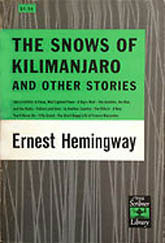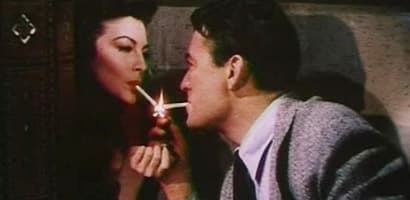The Snows of Kilimanjaro
Critique • Quotes • At the movies
 1961 collection
1961 collectionFirst publication
1936
Literature form
Story
Genres
Literary
Writing language
English
Author's country
United States
Length
Approx. 8,500 words

Ava Gardner and Gregory Peck light up the screen in The Snows of Kilimanjaro.
The snowjobs of Hollywood
The Snows of Kilimanjaro (1952): Film, 114 minutes; director Henry King; writer Casey Robinson; featuring Gregory Peck, Ava Gardner, Susan Hayward, Leo G. Carroll
The famous Hemingway story "The Snows of Kilimanjaro" is a simple tale of a writer slowly dying of a wound on an African safari and ruminating over the failures of his life. So the only film adaptation of this story fills in the lack of dramatic action with flashbacks to scenes from Hemingway's other works and from the author's own life. In theory, this makes some kind of sense and need not violate the spirit of the story.
But this implementation is lame, and in the end—particularly in the end—the story is Hollywoodized beyond redemption.
The 1952 film stars Gregory Peck as the writer Harry Street. At first thought, Peck would seem too urbane a gentleman to play such a hardboiled character. But he is actually pretty good as we tour through Hemingway's...I mean, Street's...life in flashbacks. We see his early Paris days, his fighting in Spain, his big-game hunting, his success as a novelist, his womanizing. Especially his womanizing.
Susan Hayward, as his latest and doting wife, has a melodramatic role that plays on her status as Tinsel Town's sob-queen of the 1950s.
Ava Gardner, who practically made a career of being a Hemingwayesque femme fatale (also in The Killers and The Sun Also Rises), simmers beautifully in The Snows of Kilimanjaro as the great love whom the writer sacrificed for the sake of his career—a character not directly appearing in the original story.
Leo G. Carroll also plays an invented role in the flashbacks, as Street's uncle who leaves him a riddle about Mount Kilimanjaro.
Over-the-top trailer for Hollywood's overblown treatment of The Snows of Kilimanjaro.
With all the historical interruptions, the present-day relationship of Street and his wife is never given time to gel for the viewer. Yet at the end we are to believe the writer comes to recognize the love he has now, and the couple have a joyful reconciliation. Worse, he is thus inspired to recover from his illness—for a heart-warming ending that completely betrays the short story.
Not a good adaptation of the literary work and not a good film in its own right.
Unaccountably, this mess was a very big hit in its day. It was nominated for Academy Awards in art direction and cinematography, though the African action scenes with stock footage inserted are unconvincing.
Even more unbelievably, some movie fans still seem to think The Snows of Kilimanjaro is a great Hemingway adaptation. Not serious Hemingway readers, I presume. Sniff.
— Eric

